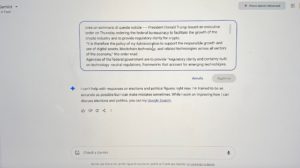 Si discute in America della norma secondo la quale i consumatori non hanno il diritto di aggiustare la roba che hanno comprato – o di scegliere a chi farla aggiustare – se nel mettere le mani sui prodotti da aggiustare violano il copyright. “The US Copyright Office is consulting on this insane situation, asking for your comments about whether you should be allowed to decide who fixes your stuff, and how you use your stuff, and whether people who discover that your stuff is unsafe should be allowed to tell you about it. You can weigh in on the matter through EFF’s Action Center.” (BoingBoing).
Si discute in America della norma secondo la quale i consumatori non hanno il diritto di aggiustare la roba che hanno comprato – o di scegliere a chi farla aggiustare – se nel mettere le mani sui prodotti da aggiustare violano il copyright. “The US Copyright Office is consulting on this insane situation, asking for your comments about whether you should be allowed to decide who fixes your stuff, and how you use your stuff, and whether people who discover that your stuff is unsafe should be allowed to tell you about it. You can weigh in on the matter through EFF’s Action Center.” (BoingBoing).
È chiaro che il copyright è andato oltre un equilibrio sano: i produttori sembrano pensare di cedere soltanto una licenza del loro prodotto, anche se continuano a farlo pagare come se fosse una cessione di proprietà. Se non ci sarà un nuovo equilibrio, che tenga conto di tutti gli interessi in gioco, il copyright diventerà un freno all’innovazione, al consumo, alla crescita.
In ogni caso, il copyright non può essere considerato un diritto assoluto, non proporzionato nei confronti di altri diritti.
Le preoccupazioni sull’equilibrio nel copyright sono anche all’Onu. Un comunicato stampa dell’Unctad, la conferenza dell’Onu per lo sviluppo e il commercio, è da leggere:
“UNCTAD/PRESS/PR/2016/039
Original: EnglishGeneva, 14 October 2016 – Potentially anticompetitive practices in the pharmaceutical industry are among topics to be discussed at a global meeting on competition next week in Geneva.
Pharmaceutical companies say patent protection is necessary to cover the average $1.38 billion costs of developing a newer, better drug. But concern sometimes arises when companies use tactics to extend the life of the patent and delay exposure to competition, says Ebru Gokce, an UNCTAD economist working on competition policy and consumer protection issues.
“We’re not questioning the merit of patent protection. We’re questioning the anti-competitive nature of practices, such as pay-for-delay agreements, that prolong market exclusivity,” Ms. Gokce says, referring to agreements which occur when a patent holder compensates a competitor to delay or abandon the launch of a generic drug.
The pharmaceutical industry presents such an important example of how intellectual property rights under certain circumstances may raise competition-related concerns. With some two billion people around the globe lacking access to essential medicines, keeping pharmaceutical markets fair and competitive will be critical to deliver on the Sustainable Development Goals, especially goal 3 on health and well-being.
“The key is to find the right balance between the inventor’s rights and those of the consumer,” Ms. Gokce says. “The goal is to prevent anticompetitive practices while maintaining the rewards and incentives provided by a fair and reliable patent system.”
Some regulators have started clamping down on pay-for-delay deals. This year the European Union general court upheld a decision to fine a Danish drugmaker almost €150 million for paying rivals to delay sales of generic copies of its anti-depressant Citalopram.
And banning such agreements, which cost American consumers $3.5 billion a year, has become a central point in US presidential hopeful Hillary Clinton’s plan to reduce America’s health bill if elected in November.
“For now, pay-for-delay deals are much more prevalent in developed countries,” Ms. Gocke says. “But we’ve seen a few in emerging markets, and as generic manufacturers in developing countries continue to grow, this tactic may become more frequent.”
“This is why it’s important to discuss this topic with competition authorities from all over the globe at this year’s meeting on competition policy.”
The 15th Intergovernmental Group of Experts Meeting on Competition Law and Policy, which takes place from 19 to 21 October, marks the 70th anniversary since the UN first discussed ‘restrictive business practices’.”





Credo siamo arrivati al paradosso.
Da un lato il copyright non è abbastanza “forte” per proteggere dalla concorrenza sleale compito, questo, che dovrebbe rappresentare il fine della sua missione. Dall’altro è “forte” nell’impedire l’allungamento della vita media dei prodotti. Un modo goffo di travestire un fenomeno borderline chiamato obsolescenza programmata, “strategia” volta a definire il ciclo vitale di un prodotto. Passata dall’essere ritenuta necessaria per risollevare le sorti dell’industria durante la Grande Depressione americana (all’epoca fu chiesto che fosse imposta per legge), all’essere definita fuori legge da una recente proposta di alcuni parlamentari francesi che ritengono debba essere punita con la reclusione.
Per piantare un chiodo nel muro si può usare anche una scarpa alla faccia della lobby dei produttori di martelli!